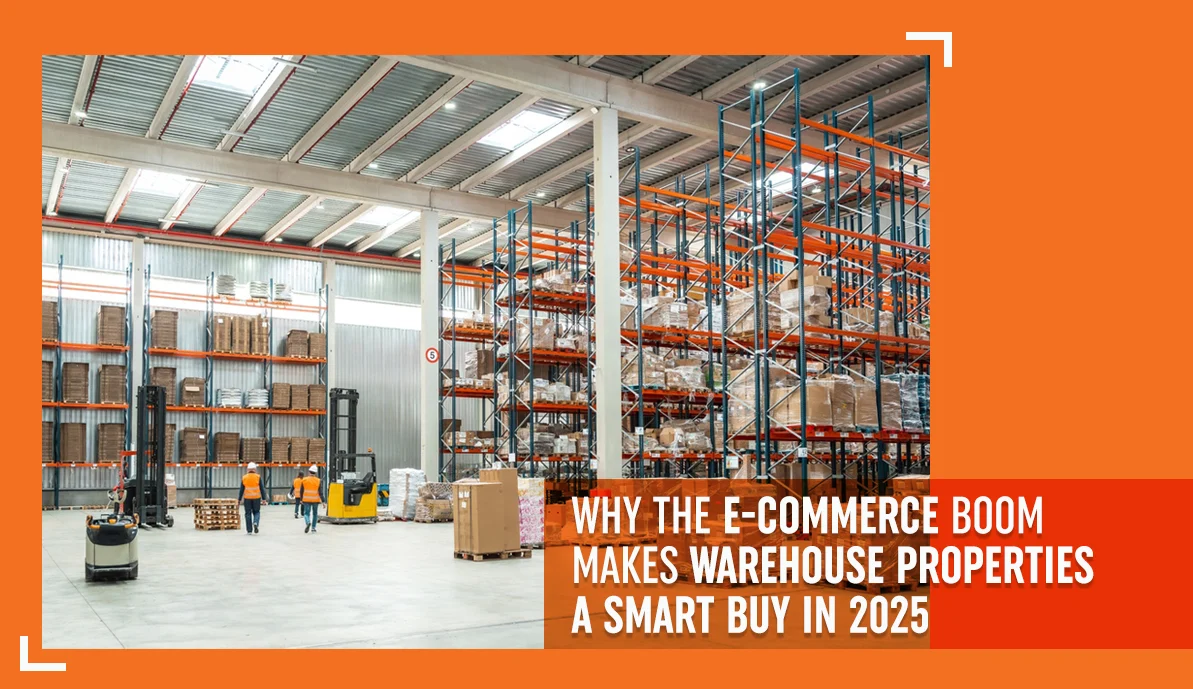In recent years, commercial real estate has undergone a significant transformation, primarily driven by the rapid growth of e-commerce warehousing. As a result, online shopping is becoming the norm rather than the exception, and demand for strategically located warehouses and distribution centres has already skyrocketed.
This trend has made several investors ask a key question. Are commercial properties a good investment in today’s market? Let us take a closer look at the evolving landscape of commercial property investment and the role of e-commerce warehousing in shaping its future.
What is E-Commerce Warehousing?
However, e-commerce warehousing refers to the storage, management, and distribution of goods sold through online platforms. Unlike traditional retail warehousing, which might service physical stores, e-commerce warehouses are designed to fulfil direct-to-consumer (DTC) orders efficiently. This involves various processes, including inventory tracking, order picking, packing, and last-mile delivery.
As companies compete to deliver faster and more efficiently, the need for strategically located, well-equipped warehouses has never been greater. According to the experts at Ganesh Complex, commercial property investors enter this high-demand sector.
The Shift from Retail to Industrial Real Estate
Commercial property investment does centre around office spaces, shopping centres and retail outlets. With the decline in foot traffic to brick-and-mortar stores and the rise of online shopping, the dynamics have shifted. Recent reports show that industrial properties, suited explicitly for e-commerce warehousing, are outperforming several other segments of the commercial real estate market.
These properties offer investors several advantages.
- High demand that is driven by e-commerce growth.
- Long-term tenants like logistics providers, retailers, and fulfilment centres.
- Consistent rental income and relatively low vacancy rates.
- Lower maintenance costs as compared to retail or office properties
It makes e-commerce warehousing facilities some of the most attractive commercial property investments today.
Why E-Commerce Warehousing is a Smart Investment Bet?
1. Surging Demand
Global e-commerce sales have been growing at a double-digit rate, a trend which got accelerated by the COVID-19 pandemic.
As physical retail rebounds, consumer habits have permanently shifted toward online shopping. This ongoing trend ensures a consistent need for e-commerce warehousing infrastructure.
2. Urban Logistics and Last-Mile Delivery
However, same-day and next-day delivery has become a standard expectation, and companies are investing in micro-fulfilment centres located closer to customers.
These smaller, urban warehouses present a golden opportunity for investors in commercial properties situated near major population centres.
3. Stable Rental Yields
In comparison to residential real estate, industrial and warehouse spaces typically offer more stable and predictable returns.
Tenants tend to sign longer leases, and turnover is typically lower. In the case of specialised e-commerce warehousing facilities, tenants are often willing to pay a premium for modern amenities and automation capabilities.
4. Resilience in Economic Downturns
E-commerce warehousing has shown strong resilience even during economic downturns. Whereas other commercial sectors like retail and office have suffered during the crisis, logistics and warehousing demand have remained strong, providing their value as a more recession-proof investment.
Challenges to Consider
Whereas commercial properties, especially those tailored for e-commerce warehousing, offer compelling investment potential, they are certainly without challenges:
-
High initial capital
Purchasing or developing industrial property requires a substantial upfront investment.
-
Zoning and regulation
It is the industrial spaces that often face strict zoning laws and environmental regulations, specifically in urban areas.
-
Technological upgrades
However, warehouses increasingly rely on automation, which requires ongoing investment to remain competitive.
-
Location risk
As with any property investment, location is key.
Investing in areas with limited access to transportation or poor infrastructure can impact profitability.
Despite these challenges, the long-term outlook remains positive for those who invest wisely and plan strategically.
Tips for Investing in E-Commerce Warehousing
If you plan to enter the commercial real estate market via e-commerce warehousing, here are a few tips:
-
Focus on logistics hubs
However, proximity to ports, highways, airports, and urban centres does increase the value of warehouse properties.
-
Evaluate the tenant mix
Always consider leasing to companies with a strong credit profile and a stable business model.
-
Consider REITs
However, if direct property ownership isn’t feasible. Then depend on
Real Estate Investment Trusts (REITs)
We specialise in logistics and industrial properties, offering a more accessible entry point.
-
Prioritize Flexibility
Modern warehouses that could be easily adapted to different tenants’ needs offer greater long-term value.
Final Thoughts
Yes, commercial properties remain a substantial investment, especially when aligned with sectors experiencing robust growth. Indeed, these e-commerce warehousing stands out as the most promising segment in today’s market.
Therefore, the ongoing rise of online shopping, the demand for faster deliveries, and advances in supply chain logistics make industrial real estate a shrewd long-term investment.
Investors who understand the dynamics of the e-commerce sector and choose their locations wisely definitely benefit from steady cash flow, asset appreciation, and a hedge against economic volatility.
Indeed, as the digital economy continues to expand, those investing in the physical infrastructure that supports it, like warehouses and logistics centres, are positioning themselves for sustained success.
Are you ready to invest? Ask yourself: Are commercial properties a good investment?
Frequently Asked Questions
1. Are commercial properties a good investment in 2025?
Yes, commercial properties, especially those geared toward e-commerce warehousing, remain a substantial investment in 2025. With rising demand for fulfilment centres, last-mile delivery hubs, and logistics infrastructure, investors are seeing consistent rental yields, long-term tenants, and solid asset appreciation in the industrial real estate sector.
2. Why is e-commerce warehousing important for commercial real estate investors?
E-commerce warehousing is crucial because it directly supports the booming online shopping industry. As businesses race to deliver faster, they require strategically located warehouses. For investors, this translates into high occupancy rates, premium rental income, and growing demand for modern logistics spaces.
3. What types of commercial properties benefit most from e-commerce growth?
The most in-demand commercial properties include:
- Distribution centers
- Fulfillment warehouses
- Last-mile delivery hubs
- Cold storage (for groceries and perishables)
These properties are essential to the supply chain and are seeing increased demand from retailers, logistics companies, and third-party fulfilment providers.
4. How does investing in commercial property compare to residential property?
While both have their merits, commercial property often offers:
- Longer lease terms (typically range from 3 to 10 years, and 6 to 12 months for residential)
- Higher rental yields
- Lower tenant turnover
- Business-to-business tenants, which can be more financially stable
In particular, industrial and warehousing properties tied to e-commerce tend to be more recession-resistant than traditional retail or office properties.









